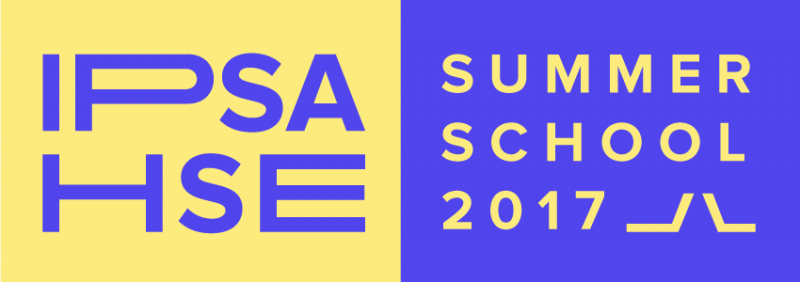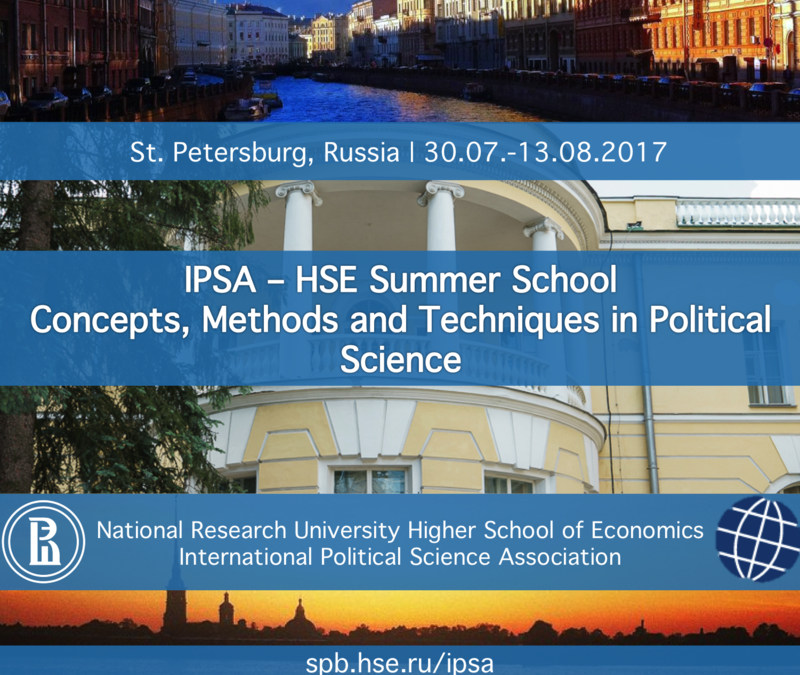
1st Annual IPSA-HSE Summer School in Concepts,
Methods and Techniques in Political Science
July 30-August 13, 2017
National Research University Higher School of Economics, Pushkin, St. Petersburg, Russia
The first annual IPSA-HSE Summer School on Concepts, Methods and Techniques of Political Science was presented at the Higher School of Economics’ Management Training Center in Pushkin, St. Petersburg (Russia) from July 30 to August 13, 2017. The school was jointly organized by the International Political Science Association (IPSA) and National Research University Higher School of Economics, with support from the Friedrich Ebert Foundation and the U.S. Consulate General in St. Petersburg.
The school’s mission is to develop student competencies, specifically in the use of modern methods of political science to advance political and social research, and to promote further cooperation within the global political research community. Overall, the School drew 24 students from eight countries, most of whom were PhD students and young researchers.
Six one-week courses on methods were offered. Instructors included Prof. Dirk-Berg-Schlosser (Philipps University of Margburg, Germany), Prof. Werner Patzelt (Dresden University of Technology, Germany), Prof. Cameron Thies (Arizona State University, U.S.), and Professors Eduard Ponarin and Boris Sokolov (HSE, Russia). Students were given a chance to take one or two courses in quantitative and qualitative research methods, with courses on qualitative comparative analysis and case study proving to be the most popular this year.
All students received a certificate of attendance and a transcript of records with ETCS (one credit for each course), and all had an opportunity to master their research skills. The school schedule was quite intense, with lectures before lunch and study groups in the afternoon.
Over and above the general program, students participated in four workshops under the aegis of the Friedrich Ebert Foundation, broadly titled “Hybrid Regimes Era: Social and Political Transformations in Post-Authoritarian Societies.” Prominent scholars and experts were invited to share ideas on issues of authoritarian modernization, digital technologies and media development, and historical legacies. Guest speakers included Prof. Vladimir Gel’man (University of Helsinki, Finland), Prof. Alexander Libman (University of Munich, Germany), Prof. Indra Overland (Norwegian Institute for Foreign Affairs, Norway), Artem Filatov (Echo of Moscow radio) and Mikhail Tyurkin (Rosbalt news agency).
Courses were given at the HSE Management Training Centre in Pushkin, a picturesque town near St. Petersburg. Students and experts learned about Russia’s cultural heritage by visiting the famous Catherine Palace and its Amber Room, as well as other attractions, including the Hermitage. Two sightseeing bus tours of the city centre were organized for participants.
View Website

.png)
2nd Annual IPSA-HSE Summer School on Methods in Political Science: Social & Political Transformations in Eurasia
July 25-August 10, 2018
National Research University Higher School of Economics, Pushkin, St. Petersburg, Russia
The second annual Summer School on Methods in Political Science: Social and Political Transformations in Eurasia was held during 25 July – 10 August 2018 at the HSE Kochubey Centre in Pushkin, St. Petersburg, Russia. The School was co-organized by the International Political Science Association (IPSA) and National Research University Higher School of Economics.
The primary mission of the School is to master students’ abilities related to the use of the modern methods of political and social research, as well as to develop cooperation of young scholars from all over the world and enhance their understanding of the global political affairs. Overall, the School gathered 62 students from 20 countries, including Russia, Germany, Brazil, France, India, Kazakhstan, the USA and others. The majority of participants are PhD students and young researchers.
Nine one-week courses on methods were organized. The School instructors were prof. Werner Patzelt (TU Dresden, Germany), prof. Cameron Thies (Arizona State University, the USA), dr. Markus Siewert (Goethe University Frankfurt, Germany), prof. Eduard Ponarin, dr. Boris Sokolov and dr. Kirill Maslinsky (HSE University, Russia). Students were able to take one or two courses, devoted to various cutting edge techniques of social research, including the Qualitative Comparative Analysis, Case Study, Regression, Text Mining, Grounded Theory and the others. Apart from this, an introductory course on Statistics in R was held to help students be better prepared for the general courses.
The methodological part of the School was very well supplemented by a course on How to Study Russian Politics, a series of after-lunch sessions organized under the aegis of the Friedrich Ebert Foundation. Among the invited experts who delivered their lectures were prof. Vladimir Gel’man (University of Helsinki, Finland), dr. Anna Tarasenko, dr. Andrey Starodubtsev (HSE University and the University of Helsinki, Finland), prof. Dmitry Goncharov, prof. Alexander Sungurov (HSE University, Russia) and others. This course has become very popular, having brought 32 students to attend it.
Two evening FES-Workshops have been organized. The first one arranged on August 4, was held by prof. Daniel Alexandrov and senior lecturer Ilya Musabirov (HSE University, Russia) on the topic of “Social Network Analysis and Digital Media in Political Science”. During the workshop the experts gave a talk on how the social media are changing the political and social environment, and how social research can use digital traces to develop their own theories. The experts also gave students some practical hints to use the software for the social network analysis.
Despite the academic program, two receptions for participants were arranged at the Kochubey-center, as well as two receptions for instructors and experts.
All students received a certificate of attendance, as well as a transcript of records with ECTS credits. The feedback from participants was positive, as they had had a chance to improve their research, get to know Russia and become more abreast of the global political issues. Experts also evaluated the School positively. Many availed themselves of the opportunity to get acquainted with the Russian cultural heritage by visiting the famous Catherine Palace with the Amber Room and other attractions, including the Hermitage. Two sightseeing bus tours were organized for the participants to get an overview of the city center.
View website
.png)
3rd Annual IPSA - HSE Summer School for Methods of Political and Social Research
August 8-17, 2019
National Research University Higher School of Economics, Pushkin, St. Petersburg, Russia
The 3rd Annual IPSA - HSE Summer School for Methods of Political and Social Research took place from August 8-17, 2019 in St. Petersburg, Russia. The Summer School is part of the IPSA Summer Schools project and is organized by the International Political Science Association and the National Research University Higher School of Economics, with the active support of the Friedrich Ebert Foundation and the Department of Political Science, HSE Saint Petersburg.
About the School
The Summer School was organized as a series of workshops, each related to one of the cutting-edge techniques in political and social research. The Summer School offered 3 short courses and 10 general courses. One of each category was taught in Russian, while the remaining was taught in English. 40 participants took the short introductory (refresher) courses during the first module (August 8-10), and the general research courses during the second module (August 12-17).
Courses
Classes of the summer school focused on such topics as Applied Regression, Social Network Analysis, Methods of Qualitative Research, Bayesian Statistics and Qualitative Comparative Analysis. Additionally, participants of the summer school were introduced to basic elements of working with Big Data using R programming. A series of seminars under the title “How to Study Russian Politics?” were also organized throughout the summer school. The round table “Methods vs. Opinion: Social Science Expertise in the Era of Fake-News and Post-Truth” became the culmination of the summer program. Participants of the round table discussed the role that social sciences are playing under political regimes known within the framework of comparative politics as hybrid.
Website: https://spb.hse.ru/ipsa
Facebook: https://www.facebook.com/methodssummerschoolhseipsa/
.png)
4th Annual IPSA-HSE Summer School for Methods of Political and Social Research
National Research University Higher School of Economics, St. Petersburg, Russia
9-22 August 2021
The Department of Political Science and International Relations, HSE St. Petersburg, in association with the Laboratory for Comparative Social Research and IPSA, will present the fourth IPSA-HSE Summer School for Methods of Political & Social Research, from 9-22 August 2021. This year’s program will be presented virtually.
The IPSA-HSE School is open to all undergraduate and graduate students and to faculty members and other professionals. The School is sure to be of interest to anyone involved in research activities in social sciences, politics, international relations, public administration, and related areas.
About the School
Advancing education in social science methodology is a way to improve the quality of research that strives to understand the inner workings of society. The IPSA-HSE Summer School supports this idea and offers a series of workshops related to one of the cutting-edge techniques in political and social research.
Courses
Week 1
- Basic Statistics and Reporting in R with RStudio / Anna Shirokanova, HSE- St. Petersburg
- Mixed Methods Research / Werner Patzelt, Germany
- Experimental Research in the Social Sciences / Israel Marques II, HSE - Moscow
Week 2
- Applied Regression / Eduard Ponarin, HSE - St. Petersburg
- Bayesian Statistics / Boris Sokolov, HSE - St. Petersburg
Advantages of the IPSA-HSE School
- Teaching Excellence: The Summer School cooperates with professional instructors and experts who have profound teaching methods and apply them to their research, published in highly ranked journals;
- Variety of Courses: Five courses on modern techniques of social research;
- Graded Certificates: Students may get up to 4 ECTS credits for the IPSA-HSE School. ECTS are given upon successful completion of examination procedures. Otherwise, all students receive certificates of participation (no indication of courses);
- Affordable Prices: The Summer School's mission is to provide affordable education! It offers quality courses at prices lower than most of the methodological schools in the world;
- IPSA - HSE Alumni: Join a vast network of IPSA Schools alumni with hundreds of students and scholars worldwide.
Eligibility
The IPSA-HSE School is open to all BA, MA, and Ph.D. students and faculty members and other professionals. The School will interest anyone involved in research activities in social sciences, politics, international relations, public administration, and related areas.
Fees:
|
Type of Fee |
General Fee |
Discounted Fee |
|
Non-refundable Registration Fee |
900 roubles |
900 roubles |
|
Participation Fee (for one course) |
15,900 roubles |
10,900 roubles |
|
The discounted fee can be paid by the students and faculty members of the HSE and other Russian educational and research institutions, by IPSA Summer Schools alumni, as well as by the citizens of the developing countries (according to the list: https://spb.hse.ru/mirror/pubs/share/242571054). |
||
Application Deadline: 1 July 2021
Further Info & ContactsWebsite: https://spb.hse.ru/ipsa
Facebook: https://www.facebook.com/ipsahse
Emails: ipsa-hse@hse.ru
.png)
Suspended for 2022.
.png)
Suspended for 2023, 2024, and 2025.











